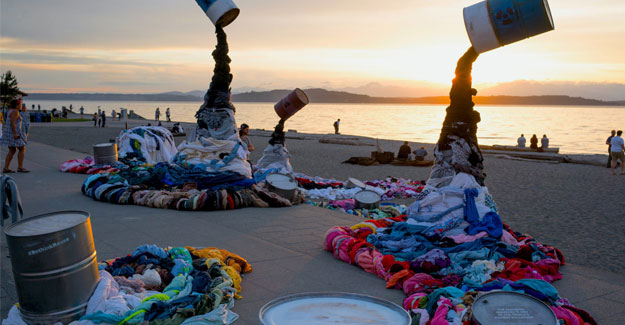
With US$ 24 Million Raised, Evrnu Wants To Scale Circular Fashion
The startup, which has partnered with Stella McCartney and Levi’s, is announcing a new round of funding that will go toward a demonstration facility. Two years after launching its first pilot with Stella McCartney and Adidas, textile recycling startup Evrnu has closed a US$ 15 million round of Series B fundraising. Now, the company is set to open a demonstration facility that could help fashion overcome one of the most significant hurdles in its quest for circularity. Evrnu promises that it can recycle used clothing into a fibre that is of high enough quality to use in new clothing — it also says it can take that clothing back at the end of its life for recycling and turn it into new clothing, again and again. If successful, Evrnu’s business model can help fashion eliminate waste and reduce pressure on natural resources — marking tangible progress toward circularity. “There's a lot of skepticism out there about what's possible. A lot of brands and investors say to us: ‘This is just hard, so I don't believe it'll ever happen,’” says CEO and co-founder Stacy Flynn. “We only work on things that are hard. We're not doing this because there's a great payoff immediately. We're doing it because the problem is huge, and we're uniquely qualified to take it on, and it's exciting.” The company is using the latest funding round, which brings Evrnu’s total raised to US$ 24 million, to push its recycling technology from proof-of-concept phase to a commercial reality. It will also use the money raised to grow its team. To date, Evrnu, a pre-revenue company, has generated US$ 3 million in revenue for initial prototyping and expects recurring revenue by the end of 2022 or early 2023. The company is attracting investors, who are increasingly evaluating businesses’ environmental and social impacts as part of their portfolio decisions, because it promises to significantly reduce waste and greenhouse gas emissions in a business-friendly way, according to Fullcycle, the firm leading the latest round. “We’re rapidly moving towards investors not just saying they care about ESG, but are having to be actually evaluated against those metrics,” says Kyle Adkins, partner at Fullcycle and senior member of the investment team. “What the entire investor community is coming to realise is that high-quality evaluation of investments using standard ESG metrics is a good proxy for well-run high-quality businesses.” The textile-to-textile recycling landscape is one that fashion has been watching closely. A number of start-ups are developing technology to turn old fibres into new ones. For instance, Infinited Fiber Company turns cellulose-rich waste streams, including post-consumer textiles, into a cotton-like fibre, and says it has purchasing agreements with Patagonia, H&M Group and Bestseller. Natural Fiber Welding turns cotton, wool and other fibres into a fabric that can replace both polyester and man-made cellulosic fibres, among others, and is working with Ralph Lauren on commercialisation. Circular Systems processes post-industrial (not post-consumer) textile waste into recycled cotton. And Circ (formerly called Tyton Biosciences) turns pre- and post-consumer textile waste into virgin-like polyester, with partner brands including H&M, Girlfriend Collective and Madewell. Evrnu’s work stands out in the market for sustainable textiles because of its ability to recycle existing clothes — a challenge because of today’s limitless mix of different fibre types and qualities, each with different needs for effective recycling — and without relying on plastic. Most of what the industry calls textile recycling today is fabric either made from plastic waste, or, at the end-of-life stage, processed into products such as insulation or mattresses (also known as downcycling, because of the decline in quality and value). Evrnu also says its own recycled fibre can be recycled five times without compromising on quality, and co-founder and chief technology officer Christopher Stanev thinks the real number is larger than that but they haven’t done the testing yet. He has ideas for how to preserve quality in future generations if the decline does become an issue.
Textile Excellence
If you wish to Subscribe to Textile Excellence Print Edition, kindly fill in the below form and we shall get back to you with details.












